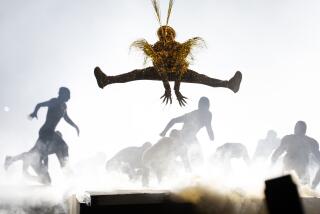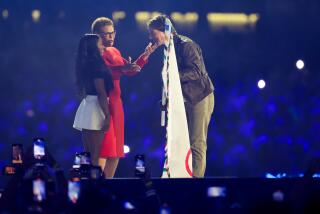THE OLYMPICS / WINTER GAMES AT ALBERTVILLE : A Glorious 16 Days for France : Closing ceremony: With the weather cooperating, these ‘impeccable’ Games once again made a national hero of Jean-Claude Killy.
- Share via
ALBERTVILLE, France — The XVI Winter Olympics closed Sunday night with a much-deserved celebration as concerns that the efforts of France’s Savoy region would be sabotaged by an avalanche of logistic problems, and perhaps snow, proved unfounded.
“These are Games which ran perfectly--impeccable Games,” said International Olympic Committee President Juan Antonio Samaranch of Spain through spokeswoman Michelle Verdier.
For the second straight time that the Winter Olympics have been held in France, Jean-Claude Killy ended them as a national hero. Twenty-four years after he won three gold medals in Alpine skiing at Grenoble, Killy was credited here, as the organizing committee’s co-president, for lending international credibility to a six-year, $717-million project that often seemed suspect.
“I want to pay tribute to Jean-Claude Killy, without whom these Games would not have been a success,” said his fellow co-president, Savoyard politician Michel Barnier, during Sunday night’s modest but joyful closing ceremony at the 36,000-seat Albertville Open Theatre.
Killy accepted congratulations on behalf of the organizers, calling the success a result of “a lot of planning and a little bit of luck.”
The luck was in the weather, which was, for the most part, excellent.
It provided enough snow to make the famous Savoy ski resorts appear like winter wonderlands to two billion potential tourists throughout the world who were watching on television but not so much that competitions or traffic were adversely affected.
Only one event, the women’s giant slalom, had to be postponed by as much as 24 hours.
The only persistent complaint among the 2,174 athletes from a record 64 countries was that they were scattered throughout the region in different villages, depriving them of much of the camaraderie that they often develop during the Olympics.
“I preferred Calgary,” said Spanish skier Blanca Fernandez-Ochoa, referring to the Winter Games in 1988. “We could see all the athletes. We lived the Olympic experience.”
But the organizers had no alternative because the competitions took place at 13 venues spread across 640 square miles of Alpine mountains and valleys.
As for the Games themselves, they will be remembered primarily for the antics on and off the slopes of Italian Alpine skier Alberto Tomba, who won a gold medal and a silver and then announced that his hedonistic lifestyle would resume as soon as the closing ceremony ended; the precociousness of Finnish ski jumper Toni Nieminen, who won two golds and a silver at age 16; the girl-next-door warmth of U.S. speedskater Bonnie Blair, who won two golds; and the grace under pressure of Kristi Yamaguchi, who survived one of the most competitive fields ever assembled to become the first U.S. woman to win a figure skating gold medal since Dorothy Hamill in 1976.
Germany won the medal race, finishing with 26, including 10 golds, but it was not the juggernaut that was predicted after East merged with West.
The East Germans won 25 medals while competing as a separate nation for the last time at the Winter Olympics in 1988, but athletes from the former German Democratic Republic contributed only 20 to the total this time.
West Germans, who won eight medals in 1988, won only four here. Biathlon relay teams consisting of athletes from both the east and the west combined for the other two medals.
Furthermore, true reunification in sports seemed further away than ever when German sports officials announced here that they will soon open an investigation into whether former East German athletes spied on teammates for the Stasi, the state’s security police.
“We Germans had to deal with the Third Reich, which lasted for 12 years,” said Walter Troeger, the head of the German delegation here. “Now we have to deal with the consequences of something that lasted for 40 years.”
The Germans finished with three more medals than the Unified Team, which had dominated the Winter Olympics under the banner of the Soviet Union since first competing in 1956.
The Soviets won their most winter medals ever with 29 four years ago, but they finished six short of that here.
The Unified Team, which consisted of athletes from five of the 15 former republics, had its successes, most notably the gold medal of its hockey team and the five-medal performances of two cross-country skiers, Lyubov Egorova and Elena Vialbe.
It also won a gold medal in men’s figure skating, something the Soviet Union never did, but the new champion, Viktor Petrenko, did not believe there would be much celebrating in his native Ukraine.
“In our country, all sports are secondary now,” he said. “People think about politics. Sports is second.”
The three former Soviet republics of Estonia, Latvia and Lithuania that competed as independent nations for the first time since before World War II won no medals.
Neither did the former Yugoslav republics of Croatia and Slovenia, which competed separately for the first time. But all returned home feeling like winners.
“It’s not important that you come home with medals,” said the secretary of the Slovenian Olympic Committee, Tomo Leuounak. “It was important that our flag was shown.”
Another winner was Norway, which won the same number of gold medals, nine, as the Unified Team, and only one less than Germany.
Two of Norway’s cross-country skiers, Bjorn Dahlie and Vegard Ulvang, each won four medals, including three golds. But the country also enjoyed its most success ever in Alpine skiing, including Finn Christian Jagge’s stunning victory over Tomba in Saturday’s slalom.
Norway’s 20 medals were an improvement by 15 over 1988 and an early indication that it plans to challenge for first place in the medal standings when it organizes the Winter Games at Lillehammer less than two years from now.
As the next host, Norway’s flag was raised alongside that of France in the closing ceremony as an angel (of mercy, no doubt) blew out the flame that had been ignited 16 days before.
More to Read
Go beyond the scoreboard
Get the latest on L.A.'s teams in the daily Sports Report newsletter.
You may occasionally receive promotional content from the Los Angeles Times.






